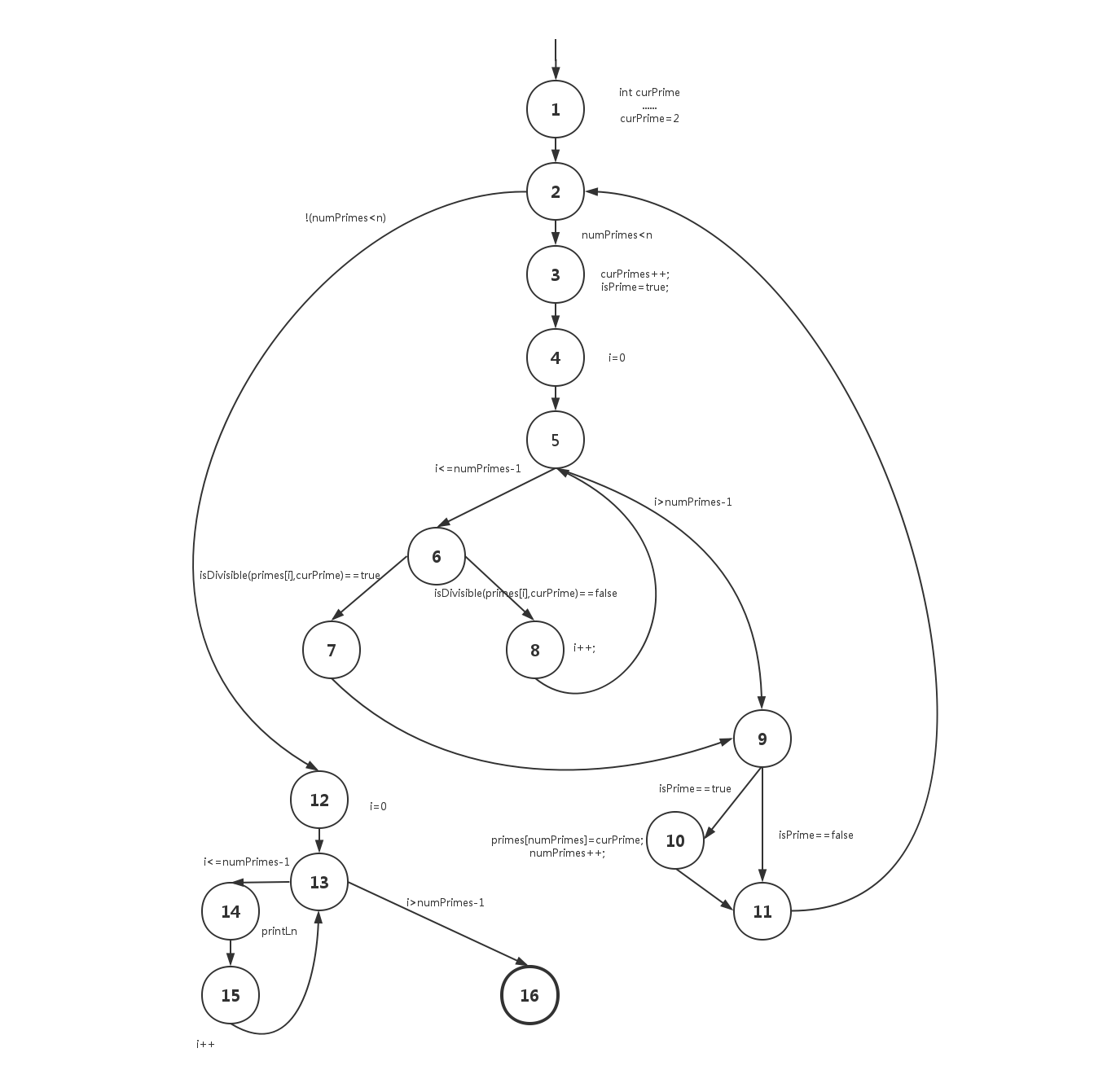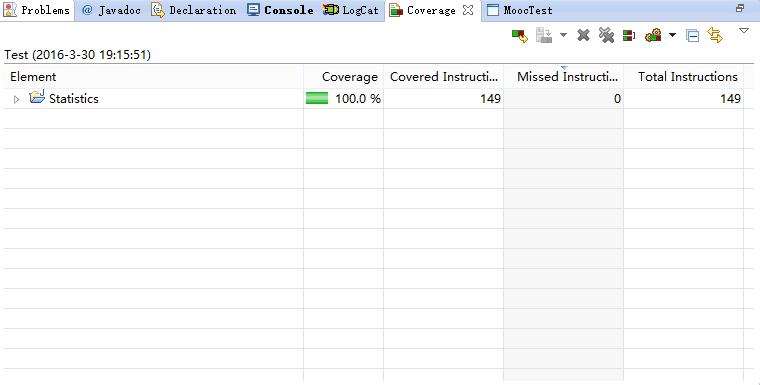Use the following method printPrimes() for questions a–d.
题目代码如下:
/******************************************************* * Finds and prints n prime integers * Jeff Offutt, Spring 2003 ******************************************************/ public static void printPrimes (int n) { int curPrime; // Value currently considered for primeness int numPrimes; // Number of primes found so far. boolean isPrime; // Is curPrime prime? int [] primes = new int [MAXPRIMES]; // The list of prime numbers. // Initialize 2 into the list of primes. primes [0] = 2; numPrimes = 1; curPrime = 2; while (numPrimes < n) { curPrime++; // next number to consider ... isPrime = true; for (int i = 0; i <= numPrimes-1; i++) { // for each previous prime. if (isDivisable(primes[i],curPrime)) { // Found a divisor, curPrime is not prime. isPrime = false; break; // out of loop through primes. } } if (isPrime) { // save it! primes[numPrimes] = curPrime; numPrimes++; } } // End while // Print all the primes out. for (int i = 0; i <= numPrimes-1; i++) { System.out.println ("Prime: " + primes[i]); } } // end printPrimes
a.控制流图

b.令MAXPRIMES=4,这样t2会测试出越界错误,t1不会。
c.输入n=1
d.
1.节点覆盖 {1,2,3,4,5,6,7,8,9,10,11,12,13,14,15,16}
2.边覆盖{(1,2),(2,3),(3,4),(4,5),(5,6),(6,7),(5,9),(6,8),(8,5),(7,9),(9,10),(10,11),(9,11),(11,2),(2,12),(12,13),(13,14),(14,15),(15,12),(13,16)}
3.基本路径覆盖{(1,2,3,4,5,6,7,9,10,11),(1,2,3,4,5,6,7,9,11),(1,2,3,4,5,6,8),(1,2,3,4,5,9,10,11),(1,2,3,4,5,9,11),(1,2,12,13,14,15),(1,2,12,13,16),(2,3,4,5,6,7,9,10,11,2),(2,3,4,5,6,7,9,11,2),(2,3,4,5,9,10,11,2),(2,3,4,5,9,11,2),(3,4,5,6,7,9,10,11,2,3),(3,4,5,6,7,9,11,2,3),(3,4,5,9,10,11,2,3),(3,4,5,9,11,2,3),(3,4,5,6,7,9,10,11,2,12,13,14,15),(3,4,5,6,7,9,10,11,2,12,13,16),(3,4,5,6,7,9,11,12,2,12,13,14,15),(3,4,5,6,7,9,11,12,2,13,16),(3,4,5,9,10,11,2,12,13,14,15),(3,4,5,9,10,11,2,12,13,16),(3,4,5,9,11,2,12,13,14,15),(3,4,5,9,11,2,12,13,16),(4,5,6,7,9,10,11,2,3,4),(4,5,6,7,9,11,2,3,4),(4,5,9,10,11,2,3,4),(4,5,9,11,2,3,4),(5,6,7,9,10,11,2,3,4,5),(5,6,7,9,11,2,3,4,5),(5,9,10,11,2,3,4),(5,9,11,2,3,4,5),(5,6,8,5),(6,7,9,10,11,2,3,4,5,6),(6,7,9,11,2,3,4,5,6),(6,8,5,9,10,11,2,3,4,5,6),(6,8,5,9,11,2,3,4,5,6),(6,8,5,9,10,11,2,12,13,14,15),(6,8,5,9,10,11,2,12,13,16),(6,8,5,9,11,2,12,13,14,15),(6,8,5,9,11,2,12,,13,16),(7,9,10,11,2,3,4,5,6,7),(7,9,11,2,3,4,5,6,7),(7,9,10,11,2,3,4,5,6,8),(7,9,11,2,3,4,5,8),(8,5,6,8),(8,5,6,7,9,10,11,2,3,4),(8,5,6,7,9,11,2,3,4),(8,5,6,7,9,10,11,2,12,13,14,15),(8,5,6,7,9,10,11,2,12,13,16),(8,5,6,7,9,11,2,12,13,14,15),(8,5,6,7,9,11,2,12,13,16),(9,10,11,2,3,4,5,9),(9,11,2,3,4,5,9),(9,10,11,2,3,4,5,6,7,9),(9,11,2,3,4,5,6,7,9),(10,11,2,3,4,5,6,7,9,10),(10,11,2,3,4,5,9,10),(11,2,3,4,5,6,7,9,10,11),(11,2,3,4,5,6,7,9,11),(11,2,3,4,5,9,10,11),(11,2,3,4,5,9,11),(13,14,15,13),(14,15,13,14),(14,15,13,16),(15,13,14,15)}
一个主路径覆盖的例子

import static org.junit.Assert.*; import org.junit.Before; public class Test { Statistics s; int a[]; @Before public void setUp(){ s=new Statistics(); a= new int[]{1,2,3}; } @org.junit.Test public void test() { assertEquals(1.0,s.calVar(a),0.001); } }

public class Statistics { /** * * @param numbers * @return the length of the array */ public int calLength(int[] numbers) { int length = numbers.length; return length; } /** * * @param numbers * @return the mean value of the array */ public double calMean(int[] numbers) { int length = calLength(numbers); double sum; sum = 0.0; for (int i = 0; i < length; i++) { sum += numbers[i]; } double mean = sum / (double) length; return mean; } /** * * @param numbers * @return the var value of the array */ public double calVar(int[] numbers) { int length = calLength(numbers); double mean = calMean(numbers); double varsum = 0.0; for (int i = 0; i < length; i++) { varsum = varsum + ((numbers[i] - mean) * (numbers[i] - mean)); } double var = varsum / (length - 1.0); return var; } }


